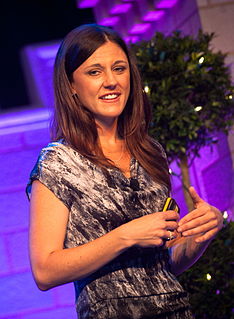A Quote by Esther Dyson
What's really going on here is, this is a media shift. It's comparable to what happened in the 1950s and the birth of electronic mass media back then.This is the birth of a new kind of personal media, where, instead of we're all watching one program, we're all watching each other. And the history of media makes it really clear. Whenever we have a big innovation, the first wave of stuff we do is pretty crummy. The printing press gave us pornography, cheap thrillers, and how-to books. Television gave us Newt Minow's vast wasteland.
Quote Topics
Back
Big
Birth
Books
Cheap
Clear
Comparable
Each
Electronic
First
Gave
Going
Happened
History
How
Innovation
Instead
Kind
Makes
Mass
Mass Media
Media
New
Other
Personal
Pornography
Press
Pretty
Printing
Printing Press
Program
Really
Shift
Stuff
Television
The History Of
Then
Thrillers
Us
Vast
Wasteland
Watching
Wave
Whenever
Related Quotes
To find something comparable, you have to go back 500 years to the printing press, the birth of mass media – which, incidentally, is what really destroyed the old world of kings and aristocracies. Technology is shifting power away from the editors, the publishers, the establishment, the media elite. Now it’s the people who are taking control.
The arrival of television established a mass-media order that dominated the last 50 years. This is a personal media revolution. The distinction between the old order and the new order is very important. Television delivered the world to our living room. In the old media, all we could do was press our noses against the glass and watch.
Thinking about free speech brought me to media regulation, as Americans access so much of their political and cultural speech through mass media. That led me to work on the FCC's media ownership rules beginning in 2005 to fight media consolidation, working with those at Georgetown's IPR, Media Access Project, Free Press, and others.
My definition of media? 'Anything which owns attention.' This could be a game or, perhaps, a platform. Ironically, the media tends to associate media with publishing - digital or otherwise - which, in turn, is too narrow a way to consider not only the media but also the reality of the competitive landscape and media-focused innovation.
During the run up to the Iraq War, Mike Farrell and I did get on television kind of frequently, but then they saw that that didn't work. They really couldn't bait us into being stupid, so they stopped. You know the mainstream media, corporate media, avoids ever giving anyone who has anything to say a platform, if they can possibly help it.
You have got to convince people, the Drive-By Media, the mainstream media, is never going to support us, and if you continue to define political success as the media supporting us and not supporting a Democrat, you're never gonna be happy, because that's never going to happen. And if that remains your measure of success, then you're gonna get fooled each and every time.
I have learned one thing, because I get treated very unfairly, that's what I call it, the fake media. And the fake media is not all of the media. You know some tried to say that the fake media was all the media, no. Sometimes they're fake, but the fake media is only some of the media. It bears no relationship to the truth.
I really am convinced that what is happening in media today is the result of the birth of conservative media and its rapid growth and ascension. It has destroyed the left's monopoly in media. When they had the monopoly, they could pretend that they were not what they are and get away with it. They could pretend to be objective. You know, the power of a monopoly is not just determining what stories you are going to cover, but what you don't cover is just as powerful.
I think TV is a medium where you can be entertained, you can be informed, you can relax and you can escape whenever you want. There's no other media, exception for fictional books, where you can do that. But additional to books you also have the picture, it's not only the text and that's the reason why, in terms of getting to the heart of the people, getting to the emotions of people, TV is the ideal media to get them. There is no other media who can do that.
I just think it should be illegal to call somebody fat on TV. . . . I think when it comes to the media, the media needs to take responsibility for the effect that it has on our younger generation, on these girls who are watching these television shows and picking up how to talk and how to be cool, so then all of a sudden being funny is making fun of the girl who's wearing an ugly dress.

































